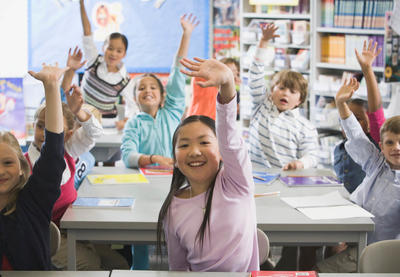As an elementary music teacher, my time with students is limited—all specials teachers can relate to this. I see my students once a week. Our classes are 40 minutes long—or even shorter if they're at the end of the day. In my second-year teacher brain, I often find myself questioning how I will get through all of the course content in such a short time. And yet…
A year ago, I went to a conference session on curriculum writing. The presenter made a point that has stuck with me: As teachers, we must ask not only what we want our students to know but also who we want our students to be when they leave our classroom. This question has been the backbone of my planning ever since. Yes, my students need to know musical concepts. But more importantly, I want them to understand how they can use music and the arts to make the world a better place.
In the second week of school this year, with the events in Charlottesville still fresh in my mind, I pulled out the children's book We Shall Overcome: The Story of a Song for my second- through fifth-grade students. I was expecting to have to explain the connections to our current times, but even the youngest students took over the conversation.
In one third-grade class, a black student shared that he was afraid to go visit his uncle, who lived in a southern state, because of what happened in Charlottesville. A white student chimed in to say that she was afraid for her sister, who is black. A third student, who spoke no English when he moved to the United States from Turkey a year ago, explained to the class (in perfect English) that he loves looking at X-rays because skin color may be different, but our bones are all the same.
In a matter of two minutes, I was reminded that these lessons and conversations would stick with the students far longer than any musical concepts they might learn in my class. If I see my students for only 40 minutes a week, why not have meaningful discussions? Why not study music that doesn't just teach skills but also develops empathy and encourages students to take action for justice?
During the past year, I have watched students' faces light up as they learn dances from Muslim countries and realize that people who live on the other side of the world may not be so different from themselves. My students and I have discussed the unfair treatment of Native Americans and the ways Native communities have communicated those experiences in music. We have learned that one song really can change the world, and students have created their own songs and action plans for doing just that.
For celebrations like Martin Luther King Jr. Day and Black History Month, many specials teachers dust off materials that they only use in January and February. Time with the students is precious, and I understand the feeling that you might have limited time to focus on the contributions of black artists and activists. But if we can integrate this content into everyday lessons, our students can truly begin to grow. Not only will they come out of our classes understanding the concepts they need to know, but they will also become fighters for a better world—and more empathetic humans.
At the end of your time with your students, who do you want them to be?
Boyer is an elementary music teacher in the Chicago suburbs. She also remains active as a freelance musician in the Chicago area.


0 COMMENTS